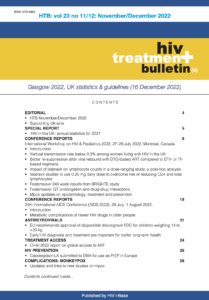HTB November/December 2022 now online
16 December 2022. Related: News.
- Contents online
- Download HIV no 11/12 – PDF (pre-proof version)
- Subscribe to HTB by email
 The final issue of HTB for 2022 includes a review of the latest HIV statistics in the UK, conference news from Glasgow, the launch of updated guidelines, including from BHIVA, and other related reports.
The final issue of HTB for 2022 includes a review of the latest HIV statistics in the UK, conference news from Glasgow, the launch of updated guidelines, including from BHIVA, and other related reports.
We also pay tribute to two leading activists – Giulio Maria Corbelli and Chris Sandford – who were friends of i-Base for many years and who recently died.
This has been a difficult year with complications from COVID continuing and against the backdrop of the Russian invasion of Ukraine.
And just as we were emerging from two years dominated by COVID, early cases of monkeypox – now newly renamed as mpox – were reported in the UK. This rapidly expanded to thousands of cases in the UK and more that 80,000 cases globally, often with 40–50% of cases in people living with HIV.
Over the last six months, HTB included more that 40 reports on mpox including five special reports due to the lack of emergency funding to support health services in the UK.
Luckily mpox cases have now dramatically dropped in the UK and many other countries, even where vaccine access is limited. This is good news, although it makes it difficult to evaluate vaccine efficacy. Although it is difficult to predict the risk of further outbreaks, most health authorities still urge caution. With less than a handful of cases now being reported each week in the UK, enrolment into the PLATINUM study is still recommended, to hopefully find out the benefits of tecovirimat as mpox treatment.
We lead this issue with a report on the latest UK data on HIV diagnoses, care and prevention. This remarkable body of information is meticulously compiled every year from multiple sources and is the basis for understanding the UK epidemic. Significant differences by demographics include rates of late and very diagnoses, which also correlate with access to PrEP. For example, the median CD4 count for gay and bisexual men is double that of straight men (443 vs 221), linked to more frequent HIV testing with PrEP.
While >70% of gay and bisexual men who could benefit from PrEP are able to access PrEP, these rates drop to 33% of straight men and only 23% of women.
Other news includes the launch of several updated guidelines, notably the main UK (BHIVA) guidelines on management of HIV in adults. These now recommend ART based on second-generation integrase inhibitors (dolutegravir or bictegravir) both for first-line treatment and in annual evaluations of people stable on other ART.
The UK has also now moved to national prescribing for each country which should make access to choice of ART more equitable, although some combination formulations will no longer be available or widely used, when generic components are available.
As we approach the upcoming holidays, i-Base would like to wish all readers best wishes for the upcoming year ahead, and to thank all contributors, editors, advisers and funders for all your support for HTB and other i-Base projects.
